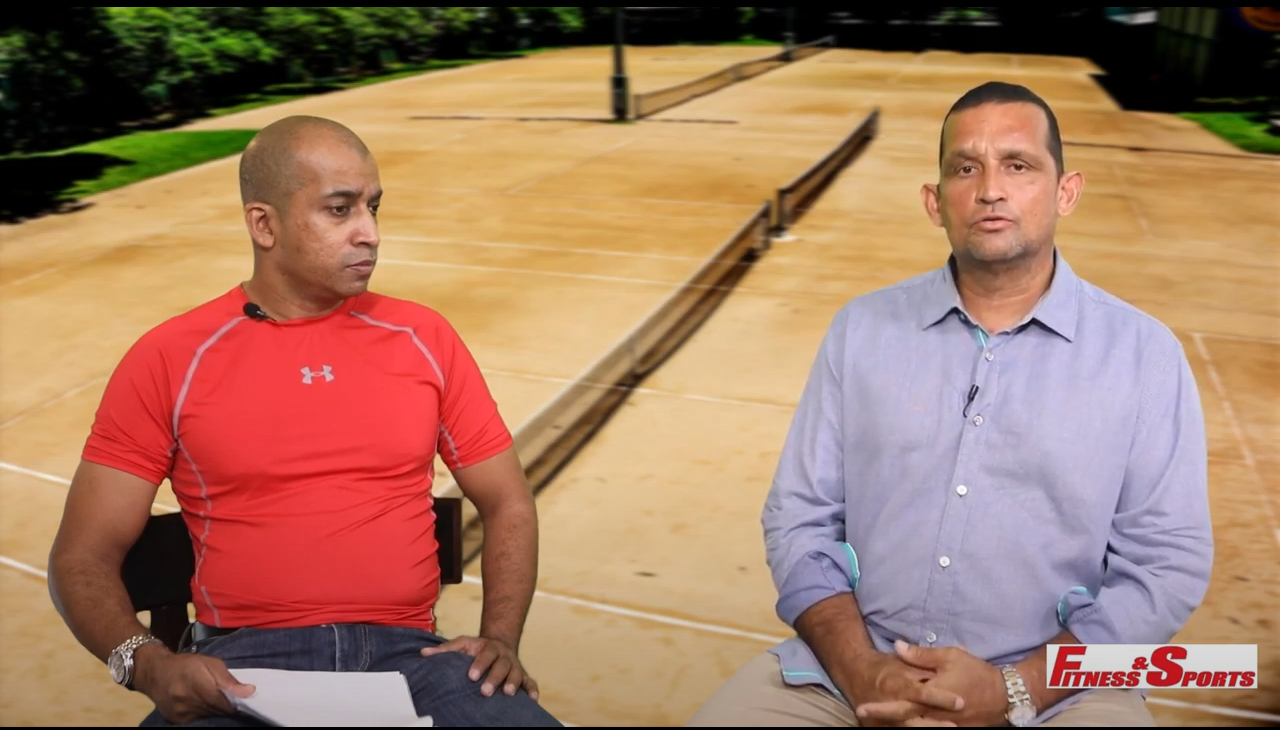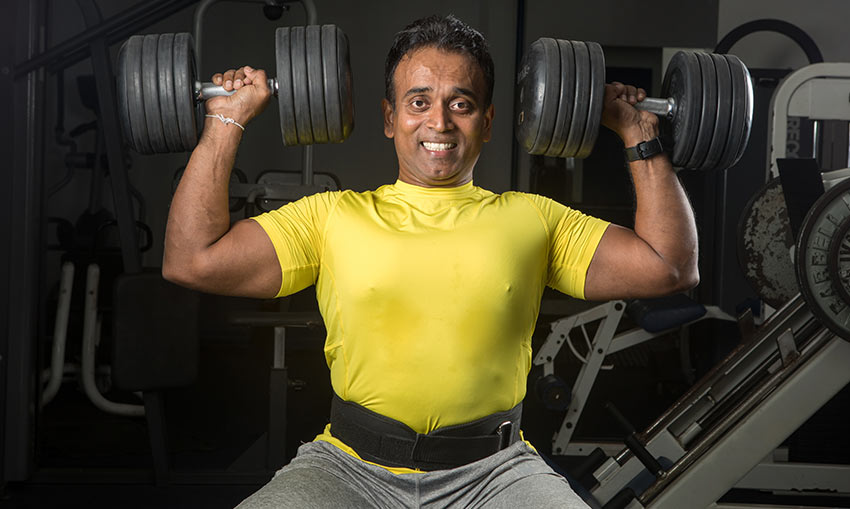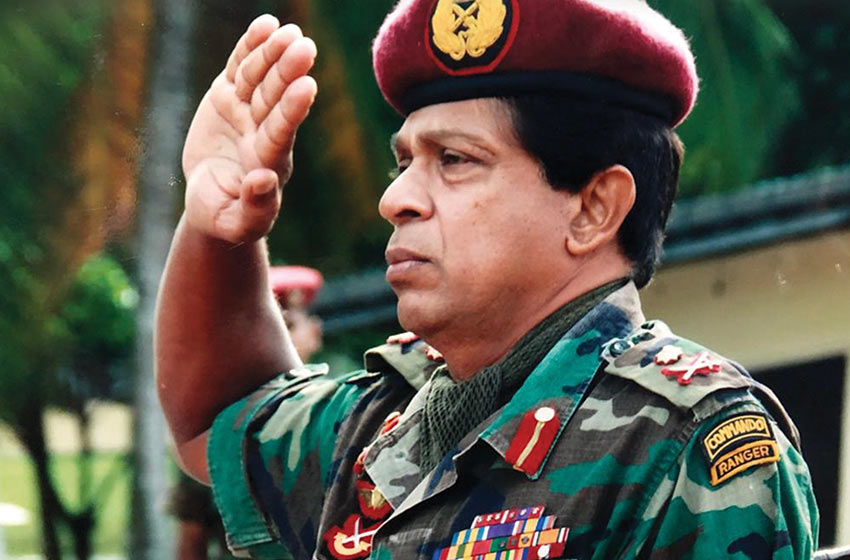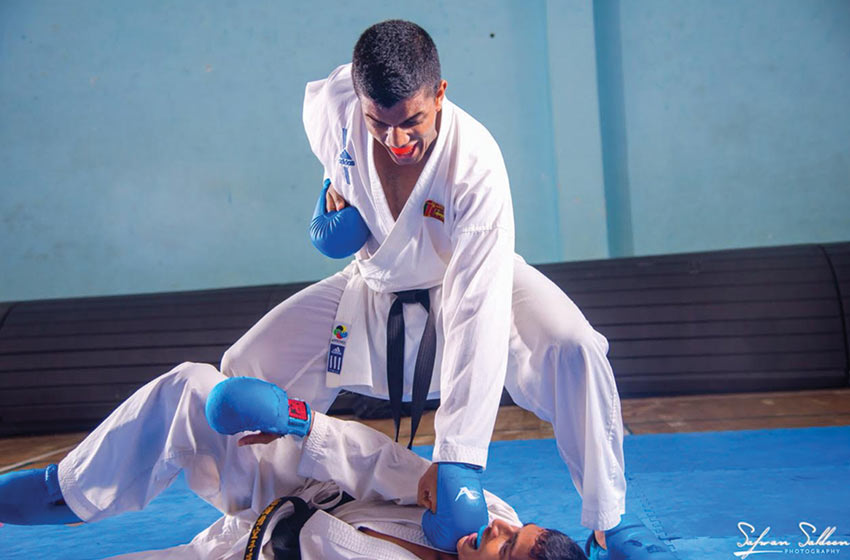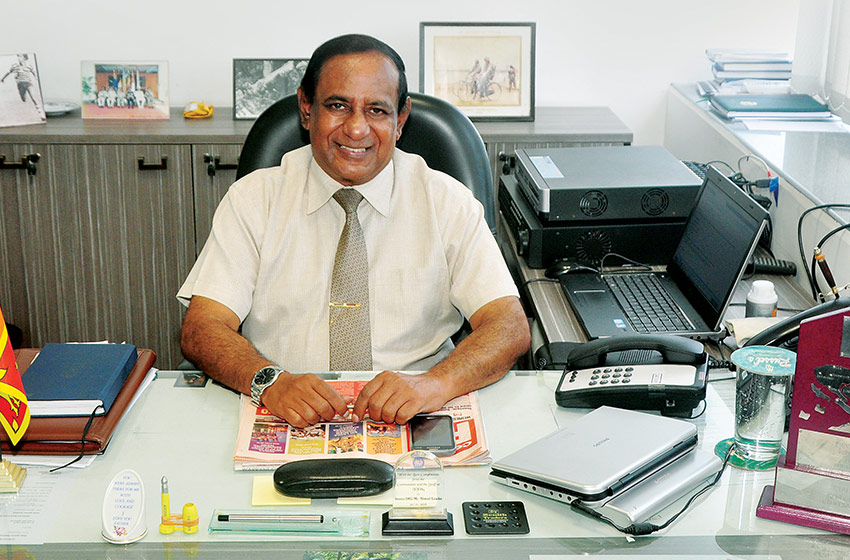
Warning: Illegal string offset 'single_ad_position' in /home/fitnessandsports/public_html/wp-content/themes/vinkmag/vinkmag/core/hooks/blog.php on line 187
Sportsman, Warrior, Gentleman
Senior Deputy Inspector General of Police (DIG) (Retd) Nimal Lewke was Commandante of the elite Special Task Force of the Sri Lanka Police. The STF as they are generally known are one of the world’s best special operational fighting units. The STF are indeed a very special breed of men and to lead them in battle requires leadership of the highest caliber. Fitness & Sports is honoured to interview Nimal Lewke who was an exemplary sportsman and who carried forth the disciplines learnt through participating in sports to his career in the Sri Lanka Police and the Special Task Force.
F&S: Could you share with us your sporting achievements?
NL: I started my sports career at St Sylvester’s College Kandy. The college has produced some of the best boxers that Sri Lanka has seen such as the Bulner brothers, Gunasinghe brothers, DC Weerasinghe, ACR Herath, SJ Samaraweera and many others. My boxing coach was Derrick Raymond who was the Peradiniya University Marshal at the time. In 1964, at the age of 13, I was the Sri Lankan schools champion for the Under 65 lbs weight category. I went on to win the Stubb Shields and Junior Nationals in the 100 to 105 lbs weight category in 1966 and 1967.
At that time there was the Upcountry Vs Low Country Schools Tournament which was a prestigious sporting event. I fought HDR Jayaweera from Carey college who was a very good boxer. Our bout was the last of the evening and the scores were even, 7 bouts each. I won this bout and the Upcountry Schools won, so it was a memorable win for me; to win in front of my home crowd.
In 1970, I entered the Intermediates as a schoolboy. In this tournament I had an interesting encounter with a fellow competitor who happened to be a prisoner. The other boys in the dressing room, were teasing me as I was fighting against a very dangerous man and that I would be seriously harmed. Before we fought, my opponent, the prisoner, came up to me and questioned me and told that he is a prisoner. However, I beat him because I was a more technical fighter. In 1970 I won the Best Boxer title in the Intermediates for the Danton Obeysekera Challenge Trophy. As a schoolboy I fought grown men.
In 1971 I represented Sri Lanka in boxing in the Fly Weight Class (112 ½ lbs) at the Tata Sports Festival in India. We (Sri Lanka) won that tournament 4 bouts to 3 bouts. In 1972 and 1973 I was the National Champion in the Bantam Weight Class (119 lbs). I also represented Sri Lanka in the Kings Cup in Thailand in 1975.
My rugby career began in 1970 when I was 19 years old at the Kandy Sports Club (KSC). I played scrumhalf and my coach was the late Lieutenant General Denzil Kobekaduwa, Dr. V.C De Silva and Dr. S.K Sangakkara who was the President of Kandy Sports Club at the time, they taught me the basics of rugby. I looked up to Lieutenant General Denzil Kobekaduwa as a ruggerite and later on as a brave soldier. He captained Kandy Sports Club and also assisted in the coaching. He played a key role in developing the club. Lieutenant General Denzil Kobekaduwa was a great officer and a great gentleman.
I joined the Sri Lanka Police in 1972 when I was 21 years old. I boxed for the Police and won the Nationals as a Police Officer. In this year the Police won the Rugby Clifford Cup for the first time and I was in that squad. I was in the Police Team that won the Clifford Cup in the years 1972,1973,1979 and in 1980 when I was the captain. In 1980 I was awarded the prestigious “Sportsman of The Year” award for the Police Department. Back then rugby was “The Game” in the Police. The Inspector General, Officers and their families used to come to watch all the matches. I also represented the Police in Division 1 Cricket.
I played rugby for Sri Lanka against the visiting teams in the years 1979 and 1980. I am proud to say that Kandy Sports Club won the Tripple Crown for the first time under my coaching in thier rugby history in 1995 & repeated this performance in 1996 & 1997. St Thomas’s College were unbeaten League Champions in 2001. St Peters College came to the finals of the President’s Trophy in 1994. When I coached the Sri Lanka side we lost only 1 game in the years between 1999 till 2002. Every rugby team that I coached was successful.
In the years 1979 and 1980 I was a member of the Police Team that won the President’s Trophy Pistol Shooting Tournament which included teams from all the Armed Forces. This tournament was started by Mr Ravi Jayawardena to get Police and Armed Forces personnel to improve their standard of pistol shooting as it is a requirment for an effiticient VIP security outfit.
F&S: When did you first start playing sports and who encouraged you?
NL: My father was a doctor and he passed away when I was 10 years old. My mother encouraged me a lot to pursue sports especially after I began achieving success.
F&S: You excelled in Rugby and Boxing, what was it about these sports that inspired you to pursue them?
NL: Rugby is a team game where you have to get the support of your teammates. You cannot play this game alone. The teams that I played for, Kandy Sports Club and the Police, were not affluent teams at the time. Most members of the Police team began to play rugby after joining the Police as they did not have access to the sport at school. Despite this we were able to beat the affluent Colombo teams and become champions. The reasons being our determination to win and our ability to play as a team. In rugby they say “Winning is not Everything, But Winning is the Only Thing”. This was our motto when we played rugby. Our Police coach was the late Kavan Rambukwalle who was a great coach and moulded raw police officers who came from the villages to become champion ruggerites.
F&S: In what weight categories did you box? Were you an orthodox fighter or South Paw (lead with the Right hand)?
NL: South Paw. I was a very stylish and scientific boxer. I had excellent footwork. I had a good left uppercut and a good hook.
F&S: Who was the toughest boxer you faced?
was a former Olympian (1968) and an Asian Gold Medalist (1969) as a school boy. When we fought I lost to him in a split decision at the Sarasvathi Hall in Bampalapitiya that was packed to full capacity. Hence, the popularity of boxing in that golden era of the sport. The next year when we fought I won at the Nationals in 1971 in the Fly Weight Division.
F&S: From your experience how has boxing and rugby evolved from your competitive days to the present?
NL: In rugby, during our time there was much more interest in the game. By 3.30pm the grounds were packed. We Police Officers would look out from our windows at the Officers Mess before heading out to the grounds and see crowds of people ready to watch the game. That was the rugby following in that era.
The game of rugby has changed with the new laws. There was more kicking then. At that time the forces were doing very well. Today the competiveness amongst the local clubs has declined with only a very few clubs dominating the game.
In boxing, the interest and competitions from our time is not there any more. As school boys we fought Olympic boxers. This does not happen today. Boxing in schools has deteriorated. There is virtually no publicity or build up to a boxing meet now. There is a noticeable decline in interest towards sports in general.
F&S: Could you share the merits that sports gave you that helped in your career in the Police Force?
NL: Sports taught us first and foremost to take up defeat gracefully and to be humble in victory. At the same time to respect your opponent. In the battle front, we, the STF, did the same. We did not underestimate anyone. We were always taught to have faith in ourselves. Whether it is sports or war, there are no shortcuts. You have to adhere to the basics and be disciplined at all times. If you do the correct thing you will survive and if you are not disciplined you will perish.
F&S: Do you believe that individuals who have participated in sports make good leaders?
NL: Yes, as a sportsman for you to succeed you must have a plan and a commitment to succeed. If you do not see results you should be ready to go to an alternative plan to achieve the results. In sports we learnt that planning, strategy, determination and self-belief are essential.
In the war front self-belief is very important. This is where discipline comes in. One of my instructors who was an Ex British Special Air Service Officer (SAS: British Army Special Forces) walked upto me after a route march and told me, “I have been watching you. You are an officer who can do very well but stick to the basics. Don’t try to take short cuts. I am 56 years old and I draw my British Army pension. You will also do the same thing if you take my advice”. I led the operations to capture and destroy vital LTTE bases in the East namely the 46 Mylawattuwana base, Beirut base in Kokadichole, 48 base in Kangikudiaru. I planned the operation and led the men to attack and capture these bases. It is because I stuck to the basics, I was disciplined, determined and I had the will to win that I was successful.
F&S: Would you share with us what led you to join the Police and subsequently the Special Task Force?
NL: I joined the Police because joining as a Sub-Inspector (SI) was a big thing for an outstation boy. We saw some of the top Kandy school sportsmen joining the police and that encouraged me to follow suit.
Every Sunday morning we police officers went for firing practices to Kalutara. One Sunday morning at the firing range just after I had returned from a training stint in England, Mr. Zerni Wijeysuriya was there and he told me they have formed the Special Task Force and were looking for someone to be the Officer in Charge (OIC) and that he felt I was ideal for the position. Then when I came to the firing detail the shooter next to me was Mr Ravi Jayawardena the son of the President JR Jayawardena. He told me “Nimal I heard the good news that you are prepared to join the STF and we will be more than happy to have you”. The STF was the brainchild of Mr Ravi Jayawardena and he is the Godfather of STF. I replied him that I would have to speak to my wife before I could give my answer. When I returned home I received a message at 8pm asking me to report to Field Force Headquarters as the Commandante wanted to speak to me. When I reported there he told me that I had to go to Ratmalana to bring back 4 bodies of STF officers who had died in Jaffna. I was just married and my wife was just 22 years old and my son was only 8 months old. It was a difficult decision as I was joining a place where my life would be in danger. I did not change my decision and I joined the STF.
As an STF officer I was posted to Batticaloa where there were only 2 STF camps. The present IGP K Illangakoon was Commanding Officer of the camp in Kalladi and I was the Commanding Officer of Kallavanchykudi. That is how the STF began operations in the East.
Before my deployment with the STF I underwent 12 weeks of intense training conducted by Ex SAS officers. Prior to leaving for Batticaloa I went to the Crimes Record Division (CRD) and the Criminal Investigation Department (CID) and obtained the photographs and names of all the terrorist leaders at the time. I was fully prepared for battle and knew what was in store for us and I had a solid plan.
F&S: What is the main difference between the role of an STF operator and a conventional soldier?
NL: A conventional soldier has the opponents’ terrain marked. It is a war between 2 geographically demarcated positions from which the soldiers launch their attack. That is conventional warfare. STF operators were trained to fight a guerrilla war. We were taught all the tactics that will be used by the terrorists and to counter the same and most importantly to win the hearts and minds of the people. Without the people the terrorists cannot survive. If the people are with us half the battle is won. That was the success story of the STF in the East.
F&S: How big a role did physical conditioning play in STF training? And did it prepare you for the conditions of the battlefield.
We have long route marches every Saturday at 2pm. We march 28 km with full battle gear that weighs 8kg. Both instructors and men march. The purpose of the march is to build endurance as well as to absorb mental pressure under trying physical conditions.
We also do abseiling and run through an obstacle course. Our obstacle course was customized to train STF men. At the end of the obstacle course we have the firing practice. This is to condition us to fire accurately even when we are physically exhausted. As STF men operate in close quarter battles (CQB) with the enemy we train specially for this type of battle. We train our reflexes, quick thinking and decision making in order to counter a threat.
All STF men get a good training in hand to hand combat. We study a mix of different martial arts. My boxing training gave me a good base for this. We also do a lot of swimming as part of our training. Weight training is done at our gym where we train for muscle endurance.
F&S: Now what is your role in the sporting arena?
NL: I am the Chairman of the National Sports Council of Sri Lanka. Our role is to advise the honourable minister on sports policy matters and the development of sports.
F&S: Do you still follow a workout routine?
NL: I walk for 40 minutes every other day and I go to the gym 2 days a week where I do light weight training.
F&S: What word of advice would you offer the youngsters of today?
NL: The number 1 rule for life is discipline. This involves, punctuality, planning your day and following the plan to achieve your goals and targets. If you are unable to achieve results then shift to an alternate plan to achieve your goals and targets.
- Plan
- Implement the Plan
- Produce Results – if not change the plan, go for an alternative plan
- Always be punctual and committed.
- Set up goals in life and achieve the same at given times.
- Have confidence in yourself and in your ability to achieve what you want.
I think children must do sports for many reasons. Physical fitness, mental alertness, learn to take up challenges, accept victory and defeat gracefully. The lessons learnt from sports will hold you in good stead for life. Take me as an example, as an individual sportsman I was a champion. The sports teams I led and coached became champions. Even all the operations that I led in the battle front were successful to liberate the nation from terrorism. All these achievements were purely because of discipline, determination and dedication which is taught through sports.
Warning: Illegal string offset 'single_ad_enable' in /home/fitnessandsports/public_html/wp-content/themes/vinkmag/vinkmag/core/hooks/blog.php on line 204
Warning: Illegal string offset 'single_ad_position' in /home/fitnessandsports/public_html/wp-content/themes/vinkmag/vinkmag/core/hooks/blog.php on line 205

